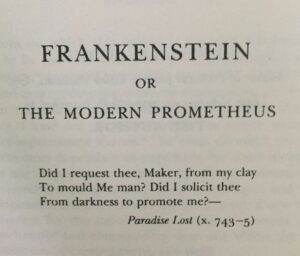Are you ready to dive into one of the most enduring and thought-provoking works of literature? Mary Shelley’s “Frankenstein” beckons readers into a world of scientific ambition, moral dilemmas, and the consequences of playing god. Strap in, because we’re about to embark on a journey through the eerie landscapes of 19th-century Europe, where the boundaries between life and death are blurred, and the human condition is laid bare.
First published in 1818, “Frankenstein” is a novel that transcends time and remains as relevant today as it was over two centuries ago. At its core, it’s a cautionary tale about the dangers of unchecked ambition and the ethical implications of scientific experimentation. But it’s also a deeply human story, exploring themes of loneliness, rejection, and the search for meaning in a world that often seems indifferent.
The narrative unfolds through a series of letters and recounted tales, drawing readers into the life of Victor Frankenstein, a brilliant but reckless scientist consumed by the desire to unlock the secrets of life and death. From the windswept landscapes of Switzerland to the icy reaches of the Arctic, Shelley’s vivid prose paints a haunting portrait of a man driven to the brink of madness by his own creation.
One of the most striking aspects of “Frankenstein” is its exploration of the moral ambiguity surrounding Victor’s actions. On one hand, he is a visionary pioneer, pushing the boundaries of human knowledge in pursuit of scientific glory. On the other hand, he is a deeply flawed and morally compromised individual, willing to sacrifice everything – including his own humanity – in the name of his ambition.
One of the scenes that stands out is Victor’s feverish obsession with creating life. In his laboratory, surrounded by flickering candlelight and the stench of decay, he toils tirelessly to bring his monstrous creation to life. The tension is palpable as he grapples with the enormity of what he is about to unleash upon the world. It’s a moment of both triumph and horror, as Victor’s creation stirs to life with a ghastly twitch.
But perhaps even more compelling than Victor himself is the creature he brings into being. Far from the mindless brute of popular culture, Shelley’s monster is a complex and tragic figure, capable of both great violence and profound empathy. It’s through the creature’s eyes that we see the true cost of Victor’s ambition – a life of loneliness, rejection, and existential despair.
One of the most poignant scenes in the novel is the creature’s encounter with a blind man living in a remote cottage. Here, we see the creature’s desperate longing for connection and acceptance, as he learns to speak and read in the hopes of winning the old man’s friendship. It’s a heartbreaking moment that highlights the profound loneliness at the heart of the creature’s existence, as well as the universal desire for companionship and understanding.
Throughout the novel, Shelley explores themes of alienation and otherness, challenging readers to confront their own prejudices and preconceptions. In Victor’s rejection of his creation, we see echoes of society’s tendency to shun those who are different or unfamiliar. But as the novel unfolds, Shelley forces us to question who the real monster is – the creature, who is born innocent but becomes twisted by rejection and cruelty, or the society that condemns him without understanding or compassion.
In the end, “Frankenstein” is a story about the dangers of playing god and the hubris of those who seek to control forces beyond their understanding. But it’s also a testament to the resilience of the human spirit, as both Victor and his creation grapple with their own demons in search of redemption and meaning.
So, if you’re looking for a gripping tale that will keep you on the edge of your seat while also provoking deep philosophical questions about the nature of humanity, look no further than Mary Shelley’s “Frankenstein.” It’s a masterpiece of gothic fiction that continues to captivate readers with its timeless themes and unforgettable characters.
Curious about the book? Don’t just take our word for it—click here to peek inside!

Want to read a bit more? Find some more of my writings here-
Pages of Passion: Short Love Story
Book Review: The Silent Patient by Alex Michaelides
Short Story: A Tale of Seeking Happiness
I hope you liked the content.
To share your views, you can simply send me an email.
Thank you for being keen readers to a small-time writer.







